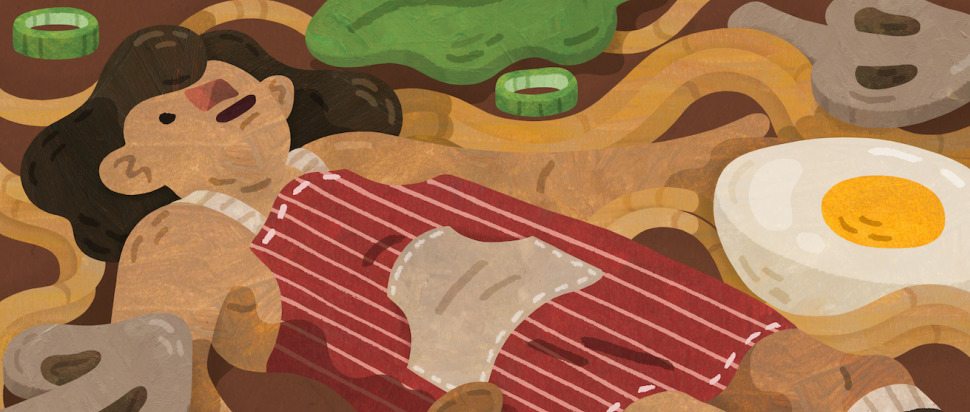Cooking Through The Storm: Home cooking & lockdown
During lockdown, food has offered comfort, therapy and connection, while simultaneously revealing stark inequalities in our society
Home cooking is kind of a new thing in the UK. People with money used to have cooks, and those without used to have things called ‘ordinaries’ – communal eating houses where you could sit at a giant table and get a set meal at a set time for mega-cheap. I read about one place, Simpson’s Fish Dinner House in London, where in the early 1700s you could get 'a dozen oysters, soup, roast partridge, three more first courses, mutton and cheese' for two shillings. Which, according to the National Archives’ handy historical currency converter, is about £11.61 in today’s peanuts.
When you think about it, it makes sense. It’s much more efficient to cook one huge pot of stew to share, than for everyone to take lamb, carrots and onions back to their own little kitchens, where they each have to spend an hour chopping, frying and boiling up a Lancashire hotpot.
During the first lockdown I helped out with a group called Food for Good. The team were cooking 3,275 meals a week for people who needed them all across Edinburgh. They were feeding families of four with chicken pies, leek and potato soup, haggis, dahl, and apple crumble for a week for just £20. When I first read those numbers I couldn’t quite believe them. But cooking and eating as a collective has a whole lot of benefits.
Lockdown exposed so many inequalities in the way we grow, share and eat food. Some people made their own sourdough starters and learned to bake bread; others were unable to access furlough or work to feed their kids. Chefs innovated and created pop-ups or special lockdown food events; but lots of hospitality and retail workers were laid off, or forced back to work in unsafe environments before they had been vaccinated.
As for me, cooking was the thing that got me through it all – the one thing every day that I could control. I perfected the roast chicken (thanks Samin Nosrat). I missed my family back in Australia, so I made a ridiculously complicated Massaman curry from my favourite restaurant in Melbourne. On one notable occasion, I made a veggie ramen that literally took my partner and I 48 hours.
We stewed shiitakes, marinated eggs in soy and caster sugar, hand-made noodles and whizzed mushroom butter together into a delicious, earthy glob. I didn’t even feel like eating it when we were done, because the eating wasn’t the point really. It was a side benefit. The real aim was to lose myself in the step-by-step.
It’s like a meditation – breathe in, breathe out, chop a carrot, have a cry – even in a global pandemic. A recipe gives us the scaffolding we need to feel what we’re feeling, and not fall down.
In July last year, I had a falling out with a friend. I didn’t understand what was happening or why. Some days I felt furious, other days I was overwhelmed with guilt. The worst days I was sure I was fundamentally unlikeable – that all my friends were just being polite, and secretly thought that I was spineless; thoughtless; weak.
Therapy helped. My ramen-making partner (bless him) helped even more. But cooking gave me the structured, predictable, delicious space I needed to actually work through the hurt and move on.
Food is complicated and simple. It is nourishment and creativity. It unifies and divides us. As we move out of lockdown, maybe we have an opportunity to rethink the way we make and share food. We obviously need to be more mindful of hygiene and social distancing now – but what else could we change? We could pool our resources, cook and eat together, share our recipes and create new ones. We could make sure that we all have access to good, affordable food – not just those of us with the time, space and money to cook at home.
Before COVID, just after I first moved to Edinburgh, I went to a Syrian Supper Club at Cyrenians. Recently-arrived Syrian refugees made a feast for everyone lucky enough to get a ticket. We all sat around a big wooden table, scoffing giant salads, stuffed courgettes, aubergine dips and these amazing crispy pita things whose name I never found out.
That dinner felt... right. Everything cooked and eaten together. It’s harder then, to draw lines between rich and poor. Food ceases to be a marker of social difference, and becomes an opportunity to share – both creativity and sustenance. That meal was a modern ‘ordinary’, and I wish that way of sharing food was more ordinary.
